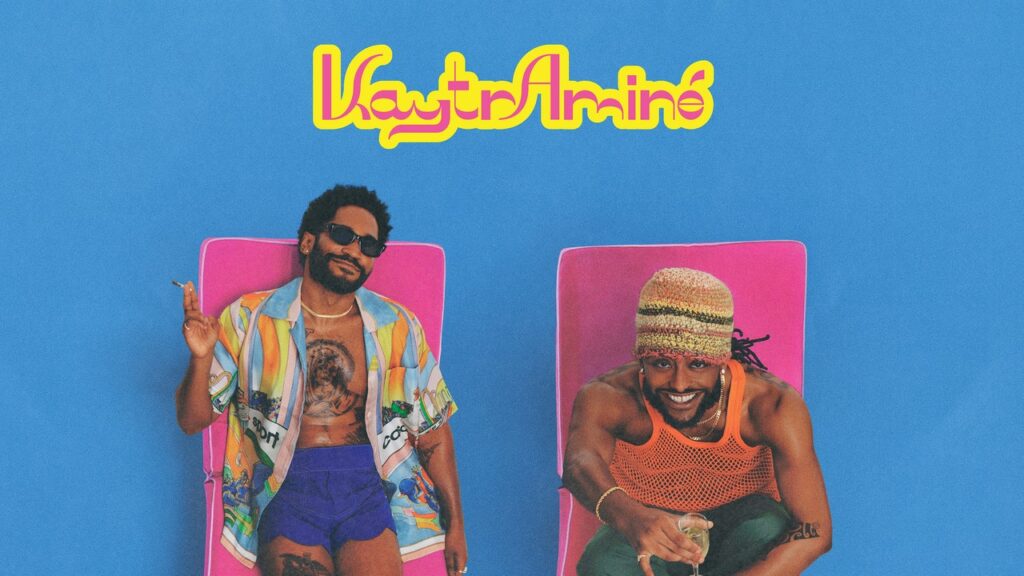
In 2014, the 20-year-old Aminé was just another college dropout with a mixtape, trawling for beats on SoundCloud. But rapping over Kaytranada’s single “At All,” his nimble flow served as the perfect foil to the Montreal producer’s funky, uptempo take on neo-soul. Kaytra—in the process of assembling his debut EP for XL—heard his remix “Not at All” and reached out to offer the beats that would go on to highlight Aminé’s 2015 mixtape Calling Brio. Despite their clear chemistry, their only other collaboration would come on Rejjie Snow’s 2018 single “Egyptian Luvr.” Then, in 2021, the pair rented a luxe beach house in Malibu and got to work. After two weeks of recording, they debuted the results to a party full of friends.
Enter Kaytraminé, the duo’s self-titled collaborative album. The 11-track LP—featuring heavy hitters like Pharrell, Snoop Dogg, and the ascendant Ghanaian singer Amaarae—is a buoyant summer jaunt that artfully meshes the two artists’ styles and sensibilities. As a producer, Kaytranada is a svengali of samples, stacking tracks like building blocks to craft fresh beats with a vintage feel. Aminé—not unlike Anderson .Paak, another Kaytra collaborator—is a goofy yet technically proficient MC with singing chops who doesn’t shy away from a twerk-friendly dance record or a crude joke.
Kaytranada’s first two albums flowed like seamless mixes, his house-adjacent style bending and shifting to suit the personalities of the guest vocalists. But his production discography is evidence of his innate ability to adapt to other artists’ styles, whether it’s Kelela, Cadence Weapon, or Freddie Gibbs. The funk-influenced tropical house of Kaytraminé wouldn’t feel out of place on Bubba or 99.9%. But there are tonal shifts that seem designed to showcase Aminé’s range as a singer and a rapper, like the strings swirling around his stop-and-go flow on “Westside” or the sparse arrangement of the latest entry in his series of “STFU” tracks.
Aminé’s two most recent solo albums balanced wistful optimism with sneering swagger, presenting him as a party boy who occasionally paused for self-reflection or a critique of consumer capitalism. That Aminé appears long gone, giving way to a hedonist whose favorite boast is his Delta Medallion status. As a party record, Kaytraminé has no skips—provided that party is loud enough to camouflage some of the cornier lyrics. Aminé’s oral (sex) fixation gets old fast, and a few lines are groan-worthy enough to distract from the fun (“Just popped an X bitch I feel like I’m Malcolm,” he raps on “Who He Iz”).
A carefully curated guest list helps prevent Kaytraminé from tumbling into an abyss of lighthearted braggadocio. Pharrell adds a sprinkle of his ageless pop perfection to lead single “4EVA,” contributing both the hook and co-production, and Amaarae manages to match Aminé’s smooth-singing dick-swinging in her own high register on “Sossaup.” But it’s hard to hear what Uncle Snoop on “Eye” or Big Sean on “Master P” add beyond bankable names; I have to imagine “Big Sean” [ft. Master P] would’ve been a more interesting song. The standout feature belongs to Freddie Gibbs, who sounds right at home on “letstalkaboutit,” wielding a rapid-fire flow as smooth as Kaytra’s plunging bassline. Gibbs doesn’t have Aminé’s vocal breadth, but the way he delivers questionable lines with caddish confidence—“Two girls suckin’ dick, I had my own Verzuz”—illustrates a fluency in the “money, clothes, and hoes” schtick that his host lacks.
If you’d like to hear a cerebral wordsmith rhyming over Kaytra beats, you’re better off seeking out his collaborations with Wiki or Mach-Hommy. Kaytraminé is a soundtrack for the young, dumb, and full of cum, a record produced by the kind of goofball who gets a kick out of being princess-carried by a woman bodybuilder and rapped by a guy whose debut LP pictured him on the toilet with his pants around his ankles. Their star-crossed bromance birthed an album best consumed in direct sun, drink in hand, with minimal clothing and even less inhibition.
